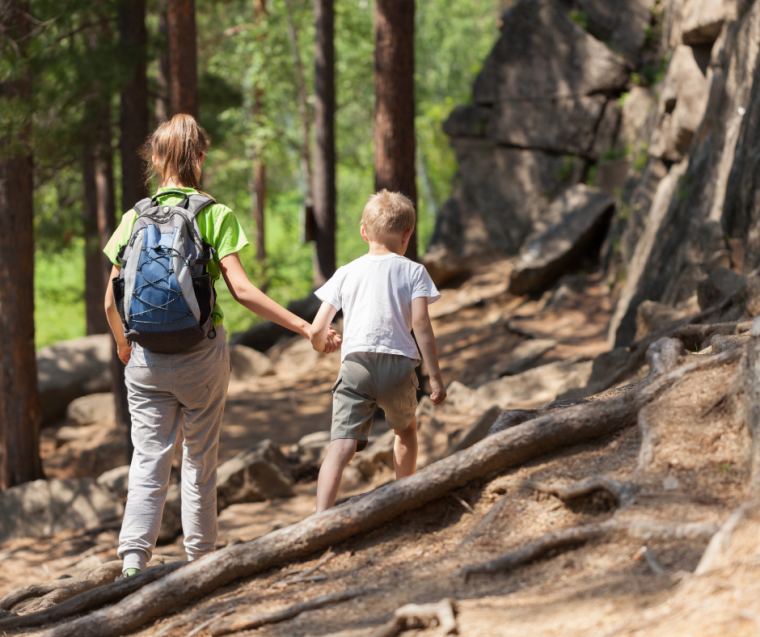People waste less when they have a love of nature, researchers have found.
With unsustainable consumption an often overlooked cause of the Climate Emergency, one evidence-based intervention to encourage people to make more sustainable choices and waste less could be to help increase people’s sense of connection to the natural world.
How connected to nature are you? Take the quiz below to find out:
Researchers at Derby University’s nature connectedness research group, led by Professor Miles Richardson, have proven that individuals who are connected to nature are more likely to act sustainably. They argue that people need to recognise and feel they “are part of nature. This is a relationship that will bring both pro-nature behaviours and improved mental wellbeing”.
Nature connectedness and links to pro-environmental and pro-nature behaviour.
Likewise, Caroline Mackay and Michael Schmitt from Simon Fraser University in Canada have found that a connection to nature results in pro-environment behaviours.

Mackay and Schmitt define nature connectedness as “an individual’s subjective sense of their relationship with the natural world” – their “oneness” with nature. An important finding for waste prevention, is that people who are connected to nature are more likely to consume less, reuse and refill. The authors conclude that, “nature connection could be beneficial to policies and interventions aimed at promoting pro-environmental behaviours”.
Additionally, their study highlighted that “individuals who are connected to nature are more likely to be flourishing and functioning well psychologically,” with increased happiness and a feeling of purpose in life. Remarkably, researchers John Zelenski and Elizabeth Nisbet from Carleton University, also in Canada, have discovered that a connection to nature is more important for wellbeing than our feelings of connectedness with family and friends. They argue that “nature relatedness could be a path to human happiness and environmental sustainability”.
How connected to nature is the UK population?
Derby University along with Natural England, the RSPB, National Trust, and others, developed a national survey to measure nature connectedness. The survey asks participants to agree or disagree to seven statements including, “I always treat nature with respect” and “being in nature makes me very happy”. Their work revealed that the UK population has an average nature connectedness score of 61 out of 100. The data showed that individuals who recycle have an average score of 63 while people volunteer for the environment sit at 76 and includes just 5% of the population. The research implies that if we can increase residents’ connection to nature, we could potentially increase recycling rates, reduce consumption, and decrease waste across north London.
So how do we connect people with nature?
“Nature connectedness is very different to mere contact with nature, which is typically measured through how frequently we visit nature or for how long,” says Natural England. Simply being exposed to nature isn’t enough to increase nature connectedness.
Derby University has developed a five-step ‘Pathway to Nature’, which has been proven to increase nature connectedness and involves:
1. Contact – engaging with nature through the senses for pleasure e.g. listening to birdsong, smelling wild flowers, watching the sunset.
2. Beauty – taking time to appreciate the beauty of nature and engaging with its aesthetic qualities e.g. appreciating natural scenery.
3. Meaning – considering the impact nature has on you and it’s place in your life, for instance, thinking about the meaning and signs of nature, e.g. the first swallow of summer.
4. Emotion – reflecting on how being in nature makes you feel; finding wonder and joy in its beauty and timelessness.
5. Compassion – thinking about the things you can do for nature; extending the self to include nature, that we form and are part of nature. This can lead to a moral and ethical concern e.g. making ethical product choices, concern with animal welfare.
The Wildlife Trust's 30 days wild intervention put this research into practice and encouraged people to pledge to one act of wildness every day for 30 days. The daily activities were designed in conjunction with Derby University and included simple activities such as walking barefoot on grass, reading a book outside or following a bumblebee. There were more involved activities too, such as building an insect hotel or visiting a wildlife reserve. The evaluation of the project found that people who had a weak connection to nature initially, felt 56% more connected to nature, with their pro-nature conservation behaviours increasing by 11% after taking part.
Interventions to help increase people’s love of nature, alongside a range of other measures including the UK government banning more single use plastics and making recycling compulsory – may well provide some of the cure desperately needed to help reduce the vast volumes of waste the UK generates. Not forgetting, of course, the bonus of improved personal happiness and wellbeing as more of us develop a love of nature. That’s called a win-win.
Take this quiz to find out how connected to nature you are, and check out our recommendations on how to increase your connection.
References
Mackay, C. M., & Schmitt, M. T. (2019). Do people who feel connected to nature do more to protect it? A meta-analysis. Journal of Environmental Psychology, 65, 101323.
Pritchard, A., Richardson, M., Sheffield, D., & McEwan, K. (2020). The relationship between nature connectedness and eudaimonic well-being: A meta-analysis. Journal of Happiness Studies, 21(3), 1145-1167.
Richardson, M., Hunt, A., Hinds, J., Bragg, R., Fido, D., Petronzi, D., ... & White, M. (2019). A measure of nature connectedness for children and adults: Validation, performance, and insights. Sustainability, 11(12), 3250.
Schmitt, M. T., Mackay, C. M., Droogendyk, L. M., & Payne, D. (2019). What predicts environmental activism? The roles of identification with nature and politicised environmental identity. Journal of Environmental Psychology, 61, 20-29.
Zelenski, J., & Nisbet, E. (2014). Happiness and Feeling Connected: The Distinct Role of Nature Relatedness. Environment and Behavior. 46. 3-23. 10.1177/0013916512451901
Richardson, M. (2017) 5 ways closer to be closer to nature.
The Wildlife Trusts (n.d) 30 days wild 5 year review.

